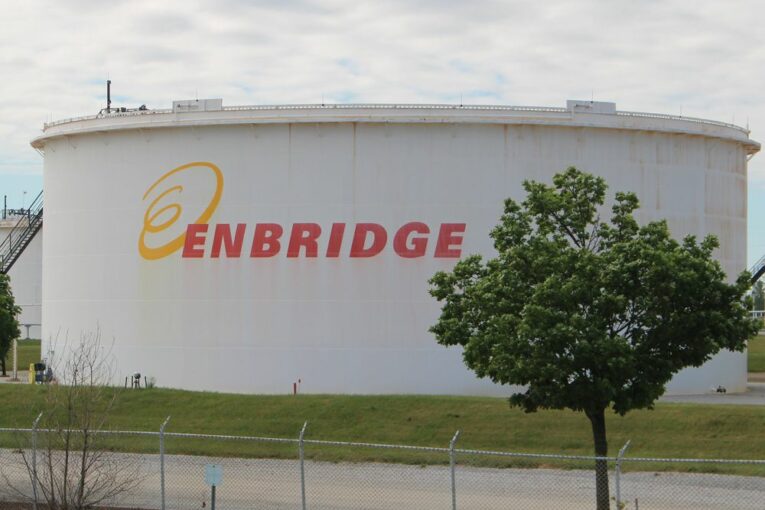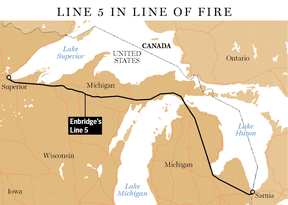
CALGARY – The State of Michigan is breaking off court-ordered mediation with Enbridge Inc., in a development that legal experts say could lead to more brinkmanship in the fight over the Line 5 pipeline that supplies oil to Ontario.
Michigan Attorney General Dana Nessel wrote in a Sept. 15 court filing that the state “unambiguously communicated to the mediator than any further continuation of the mediation process would be unproductive for them, and they have no ‘desire to continue with the mediation process,’” as she requested an end to mediation with Calgary-based Enbridge, North America’s largest pipeline company.
Enbridge and Michigan have been locked in legal battles over Line 5, and a potential replacement project, since Democratic Governor Gretchen Whitmer took office in 2019. Line 5 moves oil and propane from Western Canada to the U.S. Midwest and Ontario but crosses a critical Great Lakes waterway, the Straits of Mackinac.

In an effort to shut the line down and eliminate the risk of spill in the Great Lakes, Michigan last year cancelled a 1953 easement for the pipeline, a move that has sparked a fresh court fight and led to the court-ordered mediation.
The Attorney General’s office declined to answer questions on whether the state would take further action in an effort to shut down the line following the mediation breakdown.
Enbridge filed a complaint for injunctive relief in U.S. Federal Court in November 2020 in an effort to prevent the forced shutdown of the line and continues to fight in court.
The company told the Financial Post it would not shut down the existing pipeline unless directly ordered to do so by a court or by the U.S. pipeline regulator, the Pipeline and Hazardous Materials Safety Administration.
Shutdown of the pipeline could be outright dangerous heading into winter
Matt Taylor
“We believe in the process and have participated in this mediation in good faith,” Enbridge spokesperson Tracy Larsson said in an emailed statement. “We are committed to continuing to seek resolution, whether through mediation or pursuing diplomatic solutions consistent with the US-Canada Transit Pipelines Treaty and by asserting our rights in the courts.”
The company has proposed a replacement project for the aging Line 5 that would include a concrete tunnel beneath the Straits that, it says, would keep any potential spill out of the Great Lakes.
“We understand that the stakes in this matter are important not only for Enbridge and the State but for many others throughout the region who have strong interest in its outcome,” Larsson said.
Observers say a shutdown is unlikely and the showdown between the two sides will play out in court.
“It seems unlikely a shutdown order will be enforced while court proceedings are ongoing,” Tudor, Pickering Holt analyst Matt Taylor wrote in a research note Wednesday, noting the judge in the case has ruled the court will first consider whether the Line 5 dispute will be heard in state court or federal court before addressing the challenge to the pipeline easement.
“Furthermore, shutdown of the pipeline could be outright dangerous heading into winter,” Taylor wrote, noting that U.S. propane market is undersupplied and Line 5 “transports 55 per cent of the state’s propane needs.”
Shutting down the line would also cripple oil supplies into southern Ontario. Companies such as Imperial Oil Ltd., which operate refineries serving the Toronto area, have had to make plans to ship oil into the province using the St. Lawrence Seaway in the event the line is closed.
The Canadian government has pushed to keep the line open and has said the line’s operation is “non-negotiable,” and has raised the spectre of using a 1977 Transit Pipelines Treaty between the two countries to ensure oil keeps flowing.
Natural Resources Canada did not respond to a request for comment Thursday.
However, legal experts say there’s little Ottawa can do at this juncture other than support Enbridge in its legal battle with Michigan.
“The litigation just has to run its course,” said Mark Warner, an international trade lawyer and principal at MAAW Law in Toronto. “I can’t imaging the political capital it would take for a Democratic president to challenge a Democratic governor in litigation, like what’s he going to do? Send the troops in?”
Warner said Michigan’s move to cancel an easement for the existing pipeline issued in 1953 is “an additional kind of brinkmanship” in a larger fight to prevent Enbridge from building the Line 5 replacement project.
• Email: [email protected] | Twitter: geoffreymorgan
You can read more of the news on source
